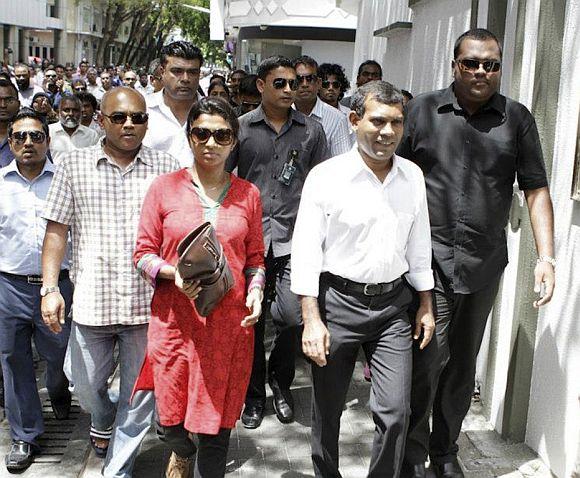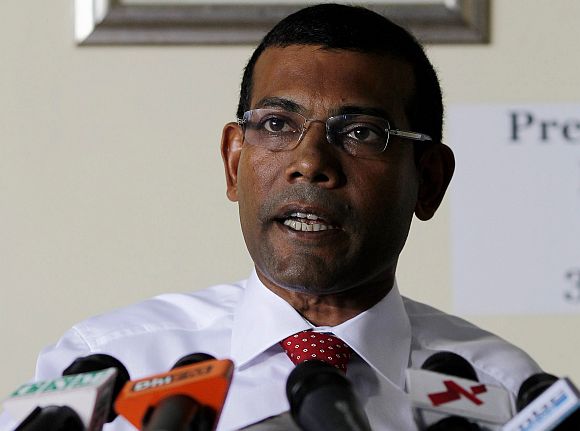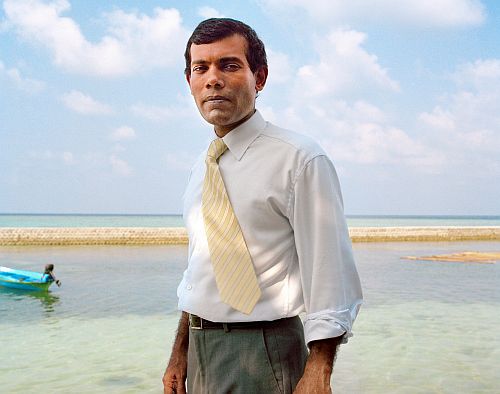 | « Back to article | Print this article |
India can't help Nasheed evade arrest: Maldives
Maldives on Thursday denied India's claim that it held discussions with Indian officials regarding former President Mohamed Nasheed, who sought "refuge" at the Indian High Commission in Male to evade arrest, saying it cannot interfere with the independence of the judiciary.
"Maldives wishes to confirm that neither the high commission of India in Male, nor any other authority of the government of India has had had discussion with the government of Maldives concerning former president of Maldives, Mohamed Nasheed's reported request for 'refuge'," Maldives' foreign ministry said in a statement.
It said that after several inquiries by the ministry, the Indian high commission confirmed Nasheed's presence there.
45-year-old Nasheed on Wednesday took refuge in the Indian high commission to evade arrest warrant issued by a local court in a case concerning the detention of Chief Judge of the Criminal Court during his Presidency in January last year.
"Nasheed's on-going trial is a matter handled by two independent State institutions, namely the prosecutor general and the judiciary," the statement said.
Click on NEXT to read further...
India can't help Nasheed evade arrest: Maldives
It said "the executive branch of the Maldives cannot, under the Constitution, interfere with the independence of the judiciary, and will indeed ensure that the independence of the judiciary is always upheld."
The statement termed as "unfortunate" what it called the "public comment" by India on events instead of opting for bilateral discussions between the two governments.
"It is further unfortunate that the government of India has decided to comment on the types of candidates that could contest the upcoming Presidential Elections in the Maldives scheduled for September 2013," it said.
In New Delhi, official spokesperson in the ministry of external affairs said on Wednesday, "Nasheed, who is a candidate for the presidential elections in Maldives scheduled for September 2013, is in the Indian high commission and has sought India's assistance. We are in touch with the relevant Maldivian authorities to resolve the situation."
Click on NEXT to read further...
India can't help Nasheed evade arrest: Maldives
The Maldivian statement said, "The independent Elections Commission has not, as of date, announced the candidates for the elections. Furthermore the government firmly believes that the Elections Commission of Maldives is fully capable of evaluating and deciding eligibility of nominees in the elections and carrying forward a credible electoral process. To presume otherwise would be undermining the democratic institutions of the country and the progress achieved by the Maldives in consolidating its democracy."
Nasheed became the first democratically-elected president of the Indian Ocean archipelago in 2008. He resigned a year ago after weeks of public protests against the judge's arrest.
His deputy, Mohammed Waheed, succeeded him.
Immediately after his resignation, Nasheed claimed that he was ousted in a coup, a claim was dismissed by an inquiry commission last year.
Click on NEXT to go further...
Top PHOTO features of the week
Click on MORE to see another set of PHOTO features...



